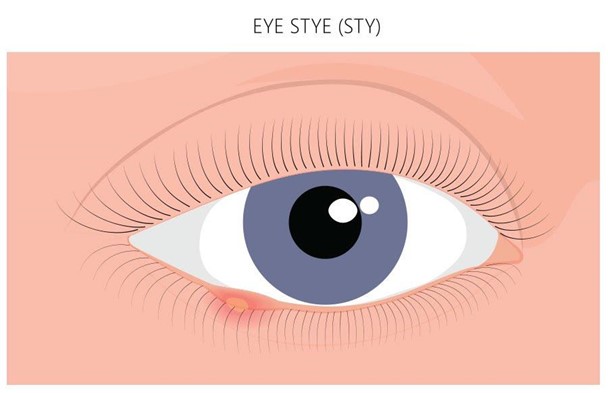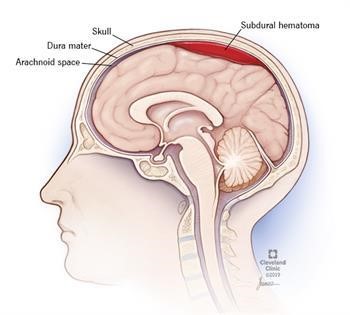A client diagnosed with a sty of the eye asks what can be done for treatment. Which of the following options will the nurse provide to the client?
An antifungal cream will be prescribed
Apply warm compresses several times a day
Use ice and cold compresses 3 times a day
You will need to have the other eye tested for vision loss
The Correct Answer is B
Choice A Reason: An antifungal cream is not indicated for a sty, which is an infection of the eyelash follicle or sebaceous gland caused by bacteria.
Choice B Reason: This is the correct answer because warm compresses can help relieve pain and inflammation, and promote drainage of the sty.
Choice C Reason: Ice and cold compresses are not recommended for a sty, as they can constrict blood vessels and delay healing.
Choice D Reason: There is no need to test the other eye for vision loss, as a sty does not affect vision unless it is very large or obstructs the pupil.

Nursing Test Bank
Naxlex Comprehensive Predictor Exams
Related Questions
Correct Answer is ["C","E","F"]
Explanation
Choice A reason: This is incorrect because the nurse should not include this in the postoperative education to the client. The client should not drive home after glaucoma surgery, as they will have reduced vision and increased sensitivity to light in the operated eye. The nurse should advise the client to arrange for someone else to drive them home.
Choice B reason: This is incorrect because the nurse should not include this in the postoperative education to the client. The client should not lay on the right side when going to bed, as this can put pressure on the operated eye and increase the risk of bleeding or infection. The nurse should advise the client to sleep on their back or on their left side.
Choice C reason: This is correct because the nurse should include this in the postoperative education to the client. The client should report flashing lights, as this can indicate a complication such as retinal detachment or vitreous hemorrhage. The nurse should instruct the client to call the provider immediately if they see flashing lights.
Choice D reason: This is incorrect because the nurse should not include this in the postoperative education to the client. The client should not nap on their left side when they get home, as this can cause fluid accumulation and increased intraocular pressure in the operated eye. The nurse should advise the client to elevate their head at least 30 degrees when resting.
Choice E reason: This is correct because the nurse should include this in the postoperative education to
the client. The client should avoid housework like vacuuming, as this can cause bending, lifting, or straining that can increase intraocular pressure and affect wound healing. The nurse should advise the client to limit physical activity and follow the provider's instructions on when to resume normal activities.
Choice F reason: This is correct because the nurse should include this in the postoperative education to
the client. The client may see flashes of light in the operated eye, as this is a normal phenomenon caused by stimulation of the retina by gas bubbles or fluid shifts. The nurse should reassure the client that flashes of light are normal and will subside over time.
Correct Answer is ["B","D","F"]
Explanation
Choice A Reason: Slow even breathing is not a sign of Cushing's Triad, which is a late indicator of increased intracranial pressure (ICP). The breathing pattern may be altered due to brainstem compression, but not necessarily slow or even.
Choice B Reason: This is a correct answer because bradycardia and bounding pulse are part of Cushing's Triad, which reflects an increased vagal tone and decreased cardiac output due to increased ICP.
Choice C Reason: Systolic hypotension with a narrowing pulse pressure is not a sign of Cushing's Triad, which involves an increased systolic blood pressure and a widened pulse pressure due to increased ICP. Hypotension may occur due to shock or hemorrhage, but not as a result of increased ICP.
Choice D Reason: This is a correct answer because irregular respirations are part of Cushing's Triad, which reflects impaired respiratory control due to brainstem compression from increased ICP. The respirations may be Cheyne-Stokes, central neurogenic hyperventilation, apneustic, or ataxic.
Choice E Reason: Tachycardia and bounding pulse are not signs of Cushing's Triad, which involves bradycardia and bounding pulse due to increased ICP. Tachycardia may occur due to pain, anxiety, fever, or hypoxia, but not as a result of increased ICP.
Choice F Reason: This is a correct answer because systolic hypertension with a widening pulse pressure are part of Cushing's Triad, which reflects an increased cerebral perfusion pressure due to increased ICP. The diastolic blood pressure remains stable or decreases, resulting in a widened pulse pressure.

Whether you are a student looking to ace your exams or a practicing nurse seeking to enhance your expertise , our nursing education contents will empower you with the confidence and competence to make a difference in the lives of patients and become a respected leader in the healthcare field.
Visit Naxlex, invest in your future and unlock endless possibilities with our unparalleled nursing education contents today
Report Wrong Answer on the Current Question
Do you disagree with the answer? If yes, what is your expected answer? Explain.
Kindly be descriptive with the issue you are facing.
